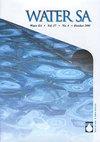万德克鲁夫大坝水质特征及其虹鳟鱼养殖潜力
IF 1.2
4区 环境科学与生态学
Q4 WATER RESOURCES
引用次数: 0
摘要
在2014年11月至2016年4月期间,对Vanderkloof大坝进行了定期采样,以获取一系列水质参数,以评估虹鳟网箱养殖的潜力。在夏季和秋季,大坝是强烈分层的,尽管上层水柱温度相对较低,但9.5℃可能会加剧这些生理挑战。相对于更上游的地方,靠近大坝的地方的水文条件最适合养鱼。在这里,夏秋季节在温跃层/低阴离子中形成的缺氧情况不太明显,特别是南岸,总悬浮固体浓度通常<10 mg·L−1,水的清澈度更有利于鱼类等视觉食性动物。虽然虹鳟鱼可以在夏季普遍存在的不利条件下存活,但生长可能受到损害,对疾病的易感性可能增加。本文章由计算机程序翻译,如有差异,请以英文原文为准。
Water quality characteristics of Vanderkloof Dam and its potential for rainbow trout farming
Vanderkloof Dam was periodically sampled between November 2014 and April 2016 for a range of water quality parameters to assess the potential for cage culture of rainbow trout, Oncorhyncus mykiss. The dam is strongly stratified in summer and autumn, although upper water column temperatures remain relatively cool, largely <25°C. The dam is considered oligotrophic, characterised by phosphorus limitation of primary production, particularly during summer. Light is strongly attenuated in the epilimnion and heterotrophic community metabolism is observed through much of the water column. Surface nutrients are depleted through the summer with phytoplankton assemblages dominated by the green algae, Oocystis lacustris, Desmodesmus bicaudatus and Coelastrum microporum. The water column turns over during the winter and the nearly isothermal impoundment approaches 11°C. Nutrients are re-introduced into surface waters following winter mixing coincident with an increase in diatoms. The preferred environmental window for rainbow trout becomes severely contracted during the summer in that epilimnion temperatures exceed 21°C and thermocline/hypolimnion oxygen concentrations fall below 3 mg‧L−1. The coincidence of relatively high pH >9.5 could exacerbate these physiological challenges. Hydrological conditions for fish farming are most suitable in the proximity of the dam wall as opposed to further upstream. Here the hypoxic conditions that develop in the thermocline/hypolimnion during summer and autumn are less pronounced, particularly towards the southern bank, where concentrations of total suspended solids are generally <10 mg‧L−1 and water clarity is more favourable for visual feeders such as fish. Although rainbow trout may survive the adverse conditions prevalent during the summer, growth is likely to be compromised and susceptibility to disease may increase.
求助全文
通过发布文献求助,成功后即可免费获取论文全文。
去求助
来源期刊

Water SA
环境科学-水资源
CiteScore
2.80
自引率
6.70%
发文量
46
审稿时长
18-36 weeks
期刊介绍:
WaterSA publishes refereed, original work in all branches of water science, technology and engineering. This includes water resources development; the hydrological cycle; surface hydrology; geohydrology and hydrometeorology; limnology; salinisation; treatment and management of municipal and industrial water and wastewater; treatment and disposal of sewage sludge; environmental pollution control; water quality and treatment; aquaculture in terms of its impact on the water resource; agricultural water science; etc.
Water SA is the WRC’s accredited scientific journal which contains original research articles and review articles on all aspects of water science, technology, engineering and policy. Water SA has been in publication since 1975 and includes articles from both local and international authors. The journal is issued quarterly (4 editions per year).
 求助内容:
求助内容: 应助结果提醒方式:
应助结果提醒方式:


